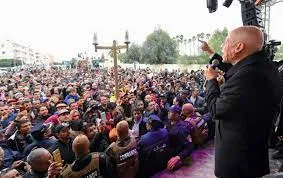Coinciding with the opposition's strike, Saied warns of conspiracies against Tunisia "up to the point of assassination"
Tunisian President Kais Saied warned of conspiracies against his country that amount to assassination, coinciding with the start of a hunger strike by opponents to demand "the resumption of the democratic process and condemnation of individual rule."
On Thursday, Tunisian President Kais Saied warned of "conspiracies being hatched" against his country, amounting to "assassination".
This came in a video clip broadcast by the official page of the Tunisian presidency via "Facebook", coinciding with the start of a hunger strike by opponents to demand "the resumption of the democratic process and denouncing individual rule."
Said said: "There are plots being hatched in Tunisia, which, according to some of them, amount to assassination."
He added, "The Tunisians should pay attention to what is being planned today by some traitors who sold their consciences to foreign intelligence in exchange for the assassination of a number of officials."
He continued, "We are not interested in life, but rather we are interested in being at the level of confidence that the people have given us. We are aware of what they are planning inside and outside."
Saeed went on to say, "We need to purify the country, and for every citizen to have the right to live in dignity and freedom," according to the same source.
Earlier on Thursday, the "Citizens Against the Coup" initiative announced the entry of parliamentarians and political figures, most notably former President Moncef Marzouki, on a hunger strike, "in rejection of individual rule and the suppression of the voices of opponents."
And “Citizens Against the Coup” is a popular initiative that presented a proposal for a road map to end the political crisis in Tunisia, including holding early presidential and legislative elections in the second half of 2022.
Since last July 25, Tunisia has been witnessing a political crisis, as a result of exceptional measures, including: freezing the competencies of Parliament, lifting the immunity of its deputies, abolishing the constitutionality monitoring body, issuing legislation by presidential decrees, dismissing the prime minister, and appointing new ones.
Prominent political and social forces in Tunisia announced their rejection of these exceptional decisions, considering them to be "a unilateral opinion and a consolidation of the authority of one individual", while other forces supported them, seeing them as an expression of the aspirations of the people.


Good
ReplyDeletegood
ReplyDelete